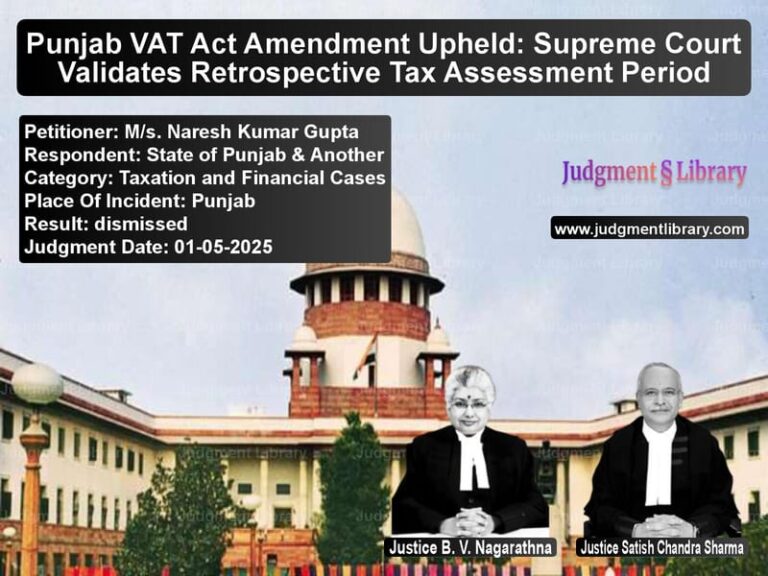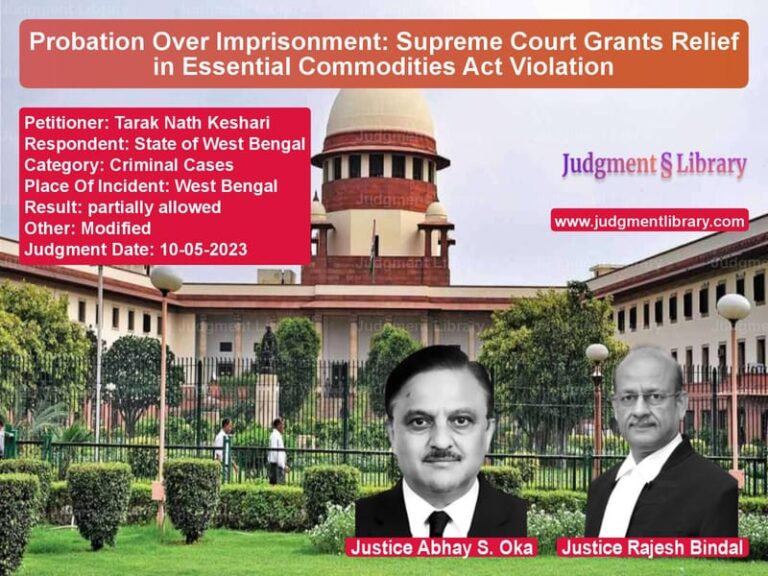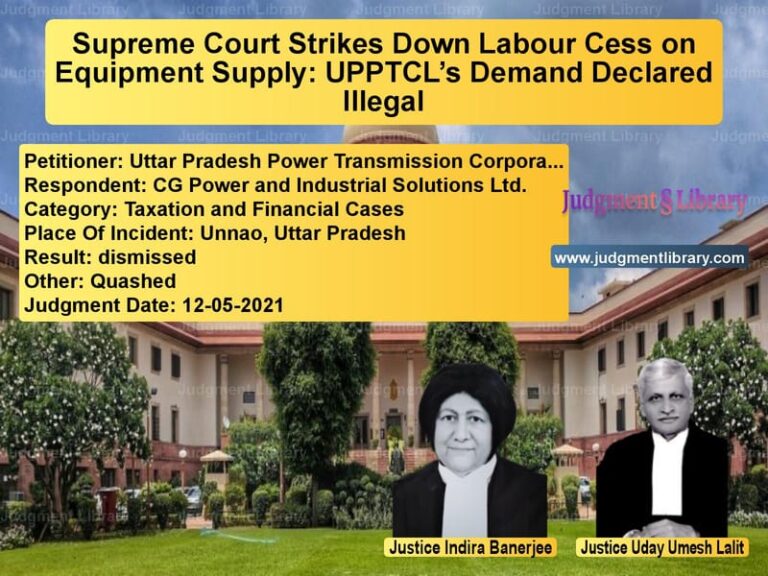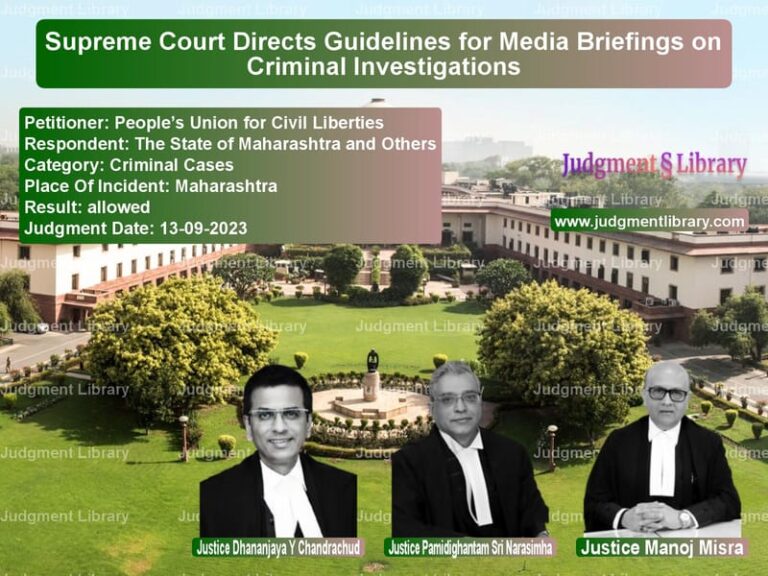Supreme Court Orders Compensation for Auctioned Property with Less Land Than Advertised
The Supreme Court of India has ruled in favor of Mrs. Leelamma Mathew in her appeal against M/s Indian Overseas Bank, in a case concerning the auction sale of property under the Securitization and Reconstruction of Financial Assets and Enforcement of Security Interest Act, 2002 (SARFAESI Act). The Court held that the bank was liable to compensate the appellant for selling less land than advertised in the auction notice.
The ruling is significant because it establishes that banks must ensure transparency in auction sales and cannot misrepresent the extent of land being sold.
Background of the Case
The case arose from an auction conducted by Indian Overseas Bank to recover dues from a borrower. The auction notice dated 23.01.2007 stated that 54 cents of land in Tanur Village, Kerala, was being auctioned. The appellant, Mrs. Leelamma Mathew, placed a bid of Rs. 32,05,000 for the land and made full payment by October 2007.
Read also: https://judgmentlibrary.com/noida-land-compensation-dispute-supreme-court-modifies-high-court-order/
However, after taking possession, the appellant discovered that the actual land area was only 39.60 cents and that the remaining 14.40 cents had been transferred by the borrower before the mortgage was created. Despite this, the bank issued a sale certificate for 54 cents and executed a sale deed for the same area in October 2010. The appellant then filed a suit for compensation for the shortfall in land.
Arguments by the Parties
Appellant (Mrs. Leelamma Mathew)
- Argued that she had paid the full amount for 54 cents but received possession of only 39.60 cents.
- Claimed that the bank misrepresented the actual land area and failed to disclose that part of the land had already been transferred.
- Contended that the sale was conditional on vacant possession and clear title, but the bank failed to meet this condition.
- Sought damages amounting to Rs. 58,10,000 for the shortfall.
Respondent (Indian Overseas Bank)
- Argued that the property was sold on an “as is where is” and “as is what is” basis.
- Claimed that the auction terms clearly stated that bidders should verify the property before bidding.
- Submitted that the appellant was aware of the land shortfall before finalizing the sale.
- Contended that the suit was barred under Section 34 of the SARFAESI Act, which prohibits civil court jurisdiction in matters related to securitization.
Observations by the Supreme Court
The Supreme Court reviewed the facts and made key observations:
- Fraudulent Misrepresentation: The bank issued a sale certificate for 54 cents despite knowing that only 39.60 cents were available.
- Breach of Duty: The bank, as a financial institution, was expected to act fairly and transparently in the auction process.
- Exemption from SARFAESI: The Court ruled that the suit was for compensation, not to challenge the auction, and thus was not barred by Section 34 of the SARFAESI Act.
The Court quoted:
“The bank ought to have issued the sale certificate only for the actual land area and refunded the excess amount paid by the appellant.”
Final Verdict
The Supreme Court allowed the appeal and ruled as follows:
- The Kerala High Court’s order was quashed, and the Trial Court’s decree was restored.
- The bank was directed to pay Rs. 58,10,000 as compensation with 12% interest per annum from the date of the suit.
- The bank was ordered to pay Rs. 25,000 in litigation costs.
Impact of the Ruling
This judgment reinforces the need for fair practices in bank auctions. Key takeaways include:
- Greater Transparency in Auctions: Banks must ensure that properties sold through auctions accurately reflect what is being transferred.
- Protection for Buyers: Auction purchasers can claim compensation if banks misrepresent land area or title.
- Judicial Oversight: Courts can intervene in disputes related to misrepresentation, even under the SARFAESI Act.
Conclusion
The Supreme Court’s ruling in this case sets a strong precedent for fair banking practices. By holding Indian Overseas Bank accountable, the Court has ensured that financial institutions adhere to transparent auction procedures and uphold buyers’ rights.
This decision will likely influence future auction-related disputes and encourage banks to exercise greater diligence in property sales.
Petitioner Name: Mrs. Leelamma Mathew.Respondent Name: M/s Indian Overseas Bank & Others.Judgment By: Justice M.R. Shah, Justice Krishna Murari.Place Of Incident: Kerala, India.Judgment Date: 17-11-2022.
Don’t miss out on the full details! Download the complete judgment in PDF format below and gain valuable insights instantly!
Download Judgment: mrs.-leelamma-mathew-vs-ms-indian-overseas-supreme-court-of-india-judgment-dated-17-11-2022.pdf
Directly Download Judgment: Directly download this Judgment
See all petitions in Property Disputes
See all petitions in Compensation Disputes
See all petitions in Damages and Compensation
See all petitions in Judgment by Mukeshkumar Rasikbhai Shah
See all petitions in Judgment by Krishna Murari
See all petitions in allowed
See all petitions in Quashed
See all petitions in supreme court of India judgments November 2022
See all petitions in 2022 judgments
See all posts in Civil Cases Category
See all allowed petitions in Civil Cases Category
See all Dismissed petitions in Civil Cases Category
See all partially allowed petitions in Civil Cases Category







